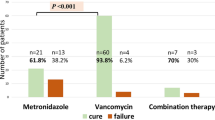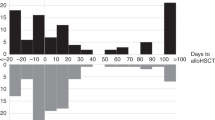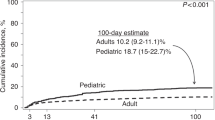Abstract
Diarrhea is a common complication of high-dose chemotherapy and hematopoietic stem cell transplantation (HSCT). The frequent and prolonged use of multiple antibiotics in this setting can predispose to infection with toxigenic Clostridium difficile and the development of pseudomembranous colitis. Anti-motility agents are usually not administered in this setting until C. difficile infection has been excluded. The objective of this study was to determine the incidence of C. difficile toxin (CDT) positivity at the time of initial diarrhea in HSCT recipients, and to see if the practice of ensuring negative CDT assays prior to initiating symptomatic management of diarrhea needs modification. One hundred and nineteen patients with malignant diseases undergoing autologous or allogeneic HSCT were studied to determine the incidence of diarrhea and CDT positivity with initial diarrhea. One hundred and nine (91%) had diarrhea. Of these, only seven (6%) were CDT+ at the time of initial diarrhea. The median interval between onset of diarrhea and starting symptomatic anti-diarrheal therapy was 1 day. There were no significant differences between the patients with CDT+ diarrhea and the others in terms of timing or severity of diarrhea, number or duration of antibiotic usage, or leukocyte count. The infection resolved in all patients with metronidazole therapy. Our data suggest that the incidence of CDT+ diarrhea is low in HSCT recipients. Concern about C. difficile infection should not delay symptomatic therapy of initial diarrhea in HSCT recipients.
This is a preview of subscription content, access via your institution
Access options
Subscribe to this journal
Receive 12 print issues and online access
$259.00 per year
only $21.58 per issue
Buy this article
- Purchase on Springer Link
- Instant access to full article PDF
Prices may be subject to local taxes which are calculated during checkout
Similar content being viewed by others
References
Mylonakis E, Ryan E, Calderwood S . Clostridium difficile-associated diarrhea Arch Intern Med 2001 161: 525 533
Kavan P, Sochor M, Nyc O . Pseudomembranous clostridium after autologous bone marrow transplantation Bone Marrow Transplant 1998 21: 521 523
Bilgrami S, Feingold JM, Dorsky D et al. Incidence and outcome of Clostridium difficile infection following autologous peripheral blood stem cell transplantation Bone Marrow Transplant 1999 23: 1039 1042
Avery R, Pohlman B, Adal K et al. High prevalence of diarrhea but infrequency of documented Clostridium difficile in autologous peripheral blood progenitor cell transplant recipients Bone Marrow Transplant 2000 25: 67 69
Chakrabarti S, Lees A, Milligan DW . Clostridium difficile infection in allogeneic stem cell transplant recipients is associated with severe graft-versus-host disease and non-relapse mortality Bone Marrow Transplant 2000 26: 871 876
National Institutes of Health and National Cancer Institute. Common Toxicity Criteria Version 2.0 1999 24
Yolken R, Bishop CA, Townsend TR et al. Infectious gastroenteritis in bone-marrow-transplant recipients New Engl J Med 1982 306: 1009 1012
Cox G, Matsui SM, Lo RS et al. Etiology and outcome of diarrhea after marrow transplantation: a prospective study Gastroenterology 1994 107: 1398 1407
van Kraaij M, Dekker AW, Verdonck LF et al. Infectious gastro-enteritis: an uncommon cause of diarrhoea in adult allogeneic and autologous stem cell transplant recipients Bone Marrow Transplant 2000 26: 299 303
Acknowledgements
This work was supported in part by the Auxiliary Board of the Northwestern Memorial Hospital.
Author information
Authors and Affiliations
Rights and permissions
About this article
Cite this article
Tomblyn, M., Gordon, L., Singhal, S. et al. Rarity of toxigenic Clostridium difficile infections after hematopoietic stem cell transplantation: implications for symptomatic management of diarrhea. Bone Marrow Transplant 30, 517–519 (2002). https://doi.org/10.1038/sj.bmt.1703703
Received:
Accepted:
Published:
Issue Date:
DOI: https://doi.org/10.1038/sj.bmt.1703703
Keywords
This article is cited by
-
Analysis of incidence and risk factors of the multidrug resistant gastrointestinal tract infection in children and adolescents undergoing allogeneic and autologous hematopoietic cell transplantation: a nationwide study
Annals of Hematology (2022)
-
Increased fecal primary bile acids in multiple myeloma with engraftment syndrome diarrhea after stem cell transplant
Bone Marrow Transplantation (2019)
-
Incidence and outcomes of Clostridium difficile-associated disease in hematopoietic cell transplant recipients
International Journal of Hematology (2014)
-
Clostridium difficile-associated disease in human stem cell transplant recipients: coming epidemic or false alarm?
Bone Marrow Transplantation (2008)
-
Incidence of Clostridium difficile-associated diarrhea before and after autologous peripheral blood stem cell transplantation for lymphoma and multiple myeloma
Bone Marrow Transplantation (2006)



